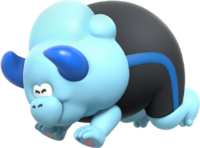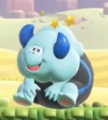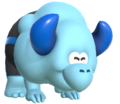Bulrush: Difference between revisions
No edit summary |
m (?) Tag: Mobile edit |
||
| Line 5: | Line 5: | ||
|comparable=[[Debull]]<br>[[Reznor]] | |comparable=[[Debull]]<br>[[Reznor]] | ||
}} | }} | ||
'''Bulrushes''' are blue ''Triceratops''/bison-like creatures wearing tracksuits that first appear in ''[[Super Mario Bros. Wonder]]''. Their name is a pun on [[Wikipedia:Bulrush|the plant of the same name]], as well as a portmanteau of "bull" and "rush", referring to their appearance and behavior. They appear prominently in a level with their own name, [[Bulrush Coming Through!]]. Normally standing idly on two legs, Bulrushes would get down on all fours and attempt to ram any player that comes too close to them. Their charging attack allows them to destroy [[Hard Block]]s and any other destructible blocks in their way. | '''Bulrushes''' are blue ''Triceratops''/bison-like creatures wearing tracksuits that first appear in ''[[Super Mario Bros. Wonder]]''. Their name is a pun on [[Wikipedia:Bulrush|the plant of the same name]], as well as a portmanteau of "bull" and "rush", referring to their appearance and behavior. They appear prominently in a level with their own name, [[Bulrush Coming Through!]]. Normally standing idly on two legs, Bulrushes would get down on all fours and attempt to ram any player that comes too close to them. Their charging attack allows them to destroy [[Hard Block]]s and any other destructible blocks in their way. Once a Bulrush collides with a wall they cannot destroy, however, they will be stunned for a short time before regaining composure. The player can stand on Bulrushes to ride them as they move. It takes six [[fireball]]s from a [[Fire Flower]] to defeat a Bulrush. | ||
During the [[Wonder Effect]] in Bulrush Coming Through!, [[Bulrush Express]], and [[The Final Battle! Bowser's Rage Stage]], a herd of Bulrushes stampede through the stage, plowing through blocks and enemies alike (even knocking away the normal [[Goal Pole]], allowing access to the secret goal) while making quick jumps high off of slopes. They are similar to [[Bonecoaster]]s in a way, as, in some levels, riding the herd is the only way to traverse mostly groundless areas and even reach important places and items, though the player will be left behind if they jump off as the herd continues rushing forward. | During the [[Wonder Effect]] in Bulrush Coming Through!, [[Bulrush Express]], and [[The Final Battle! Bowser's Rage Stage]], a herd of Bulrushes stampede through the stage, plowing through blocks and enemies alike (even knocking away the normal [[Goal Pole]], allowing access to the secret goal) while making quick jumps high off of slopes. They are similar to [[Bonecoaster]]s in a way, as, in some levels, riding the herd is the only way to traverse mostly groundless areas and even reach important places and items, though the player will be left behind if they jump off as the herd continues rushing forward. | ||
Revision as of 02:11, January 1, 2024
| Bulrush | |||
|---|---|---|---|

| |||
| First appearance | Super Mario Bros. Wonder (2023) | ||
| Latest appearance | Tetris 99 (38th Maximus Cup, cameo) (2023) | ||
| |||
Bulrushes are blue Triceratops/bison-like creatures wearing tracksuits that first appear in Super Mario Bros. Wonder. Their name is a pun on the plant of the same name, as well as a portmanteau of "bull" and "rush", referring to their appearance and behavior. They appear prominently in a level with their own name, Bulrush Coming Through!. Normally standing idly on two legs, Bulrushes would get down on all fours and attempt to ram any player that comes too close to them. Their charging attack allows them to destroy Hard Blocks and any other destructible blocks in their way. Once a Bulrush collides with a wall they cannot destroy, however, they will be stunned for a short time before regaining composure. The player can stand on Bulrushes to ride them as they move. It takes six fireballs from a Fire Flower to defeat a Bulrush.
During the Wonder Effect in Bulrush Coming Through!, Bulrush Express, and The Final Battle! Bowser's Rage Stage, a herd of Bulrushes stampede through the stage, plowing through blocks and enemies alike (even knocking away the normal Goal Pole, allowing access to the secret goal) while making quick jumps high off of slopes. They are similar to Bonecoasters in a way, as, in some levels, riding the herd is the only way to traverse mostly groundless areas and even reach important places and items, though the player will be left behind if they jump off as the herd continues rushing forward.
Profiles
- Trading card bio: This rowdy enemy charges as soon as it sees Mario or his friends, but it's not great at stopping!
Gallery
A Bulrush during a Wonder Effect
Additional names
Internal names
| Game | File | Name | Meaning
|
|---|---|---|---|
| Super Mario Bros. Wonder | G:/romfs/Model/EnemyTosshinBig.bfres.zs | TosshinBig | Big Bulrush |
| Super Mario Bros. Wonder | G:/romfs/Pack/Actor/EnemyTossin.pack.zs | Tossin | Same as the Japanese name |
Names in other languages
| Language | Name | Meaning |
|---|---|---|
| Japanese | トッシン Tosshin |
Katakana spelling of「突進」(charge) |
| Chinese (simplified) | 暴冲兽 Bàochōngshòu |
Furious Beast |
| Chinese (traditional) | 暴衝獸 Bàochōngshòu |
Furious Beast |
| Dutch | Bulrush |
- |
| French | Coursératops |
From "course" (running) and "tricératops" (triceratops) |
| German | Gallopteros |
From the English word "gallop" and possibly "triceratops" or "rhinoceros" |
| Italian | Biceratopo |
Portmanteau of "bi-" (two-) or "bisonte" (bison), and "Triceratopo" (Triceratops) |
| Korean | 돌진뿌리 Doljinppuri |
From "突進" (doljin, a sino-Korean for "dash") and "뿔" (ppul, horn), with noun-forming suffix "~이" (-i) |
| Portuguese | Atouropelo |
Pun on "touro" (bull) and "atropelo" (run over) |
| Russian | Спринтозавр Sprintozavr |
From English word "sprint" and "-завр" (-zavr, a Russian suffix used to form the dinosaur names) |
| Spanish | Embistonte |
Portmanteau of "embestir" (to charge) and "bisonte" (bison) |




